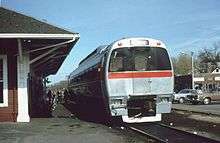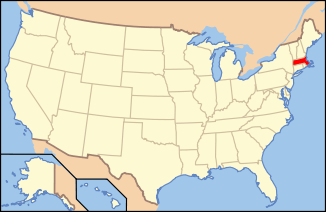Reading (MBTA station)
READING | |||||||||||
|---|---|---|---|---|---|---|---|---|---|---|---|
|
Reading Station viewed from the outbound platform | |||||||||||
| Location |
35 Lincoln Street Reading, Massachusetts | ||||||||||
| Owned by | MBTA | ||||||||||
| Line(s) | |||||||||||
| Platforms | 2 side platforms | ||||||||||
| Tracks | 1 | ||||||||||
| Connections |
| ||||||||||
| Construction | |||||||||||
| Parking | Yes | ||||||||||
| Bicycle facilities | 10 Spaces | ||||||||||
| Disabled access | Yes | ||||||||||
| Other information | |||||||||||
| Fare zone | 2 | ||||||||||
| History | |||||||||||
| Opened | 1845 | ||||||||||
| Rebuilt | 1870 | ||||||||||
| Traffic | |||||||||||
| Passengers (2008) | 799 (weekday inbound average)[1] | ||||||||||
| Services | |||||||||||
| |||||||||||
|
Boston and Maine Railroad Depot | |||||||||||
  | |||||||||||
| Location | Reading, Massachusetts, USA | ||||||||||
| Coordinates | 42°31′18″N 71°6′27″W / 42.52167°N 71.10750°WCoordinates: 42°31′18″N 71°6′27″W / 42.52167°N 71.10750°W | ||||||||||
| Area | 3 acres (1.2 ha) | ||||||||||
| Built | 1870 | ||||||||||
| Architect | Unknown | ||||||||||
| Architectural style | Stick/Eastlake, Queen Anne | ||||||||||
| MPS | Reading MRA | ||||||||||
| NRHP Reference # | 84002509[2] | ||||||||||
| Added to NRHP | July 19, 1984 | ||||||||||
Reading is a regional rail station on the MBTA Commuter Rail Haverhill/Reading Line, located at Lincoln and High Streets on the western fringe of the central business district of Reading, Massachusetts. The station's historic depot building was built in 1870 by the Boston and Maine Railroad. The station was the terminus of the line from 1959 until the re-extension to Haverhill in 1979.
Architecture and history


The Boston and Maine Railroad Extension from Wilmington Junction to Boston was completed in 1845, with intermediate stops including Reading. A new station building was constructed in 1870.[3] The depot is located southwest of the tracks, at the junction of Lincoln and Prescott Streets. It is a long rectangular building with Queen Anne styling, with paneled pilasters at the corners and between the bays, and large knee braces that help support the wide overhangs of the hip roof. The north (track-facing) facade has seven bays, alternating windows (4) and doors (3). One of the windows is a projecting bay with a band of narrow and tall windows, whose upper sash has colored lights.[3]
The station was purchased by the town in 1960, and was briefly used as a museum of railroad history.[3] The MBTA purchased the Haverhill Line in 1973, intending to replace commuter rail service with extended Orange Line subway service between Oak Grove and Reading.[4] The new Reading/128 terminus would have been located outside the downtown area just south of Route 128, rather than at the current downtown location.[5] Ultimately the extension was not built past Oak Grove due to rising costs, and commuter rail service was kept on the corridor.
The station was later rebuilt with a mini-high platform on the inbound side for handicapped accessibility. The second track, removed decades earlier was not rebuilt; the outbound platform was repaired but a second mini-high platform was not built. Thus the inbound platform serves trains in both directions. Despite this limited capacity, Reading is the terminus for some local trains on the line.
The building was added to the National Register of Historic Places in 1984.[2] The town sold the building to private owners in 1985, with preservation restrictions.[3]
Bus connections
- 136 Reading Depot - Malden Center Station via Wakefield, Melrose & Oak Grove
- 137 Reading Depot - Malden Center Station via North Ave, Wakefield, Melrose & Oak Grove
See also
References
- ↑ "Ridership and Service Statistics" (PDF) (14 ed.). Massachusetts Bay Transportation Authority. 2014. Retrieved 15 September 2016.
- 1 2 National Park Service (2008-04-15). "National Register Information System". National Register of Historic Places. National Park Service.
- 1 2 3 4 "MACRIS inventory record and NRHP nomination for Boston and Maine Railroad Depot". Commonwealth of Massachusetts. Retrieved 2015-05-18.
- ↑ Belcher, Jonathan (August 30, 2016). "Changes to Transit Service in the MBTA district 1964-2016" (PDF). NETransit. Retrieved September 15, 2016.
- ↑ Hanron, Robert (October 31, 1965). "THE M.B.T.A.: A Transit System Picks Up Speed". Boston Globe. p. C4 – via Proquest Historical Newspapers. (subscription required (help)).
External links
![]() Media related to Reading (MBTA station) at Wikimedia Commons
Media related to Reading (MBTA station) at Wikimedia Commons
